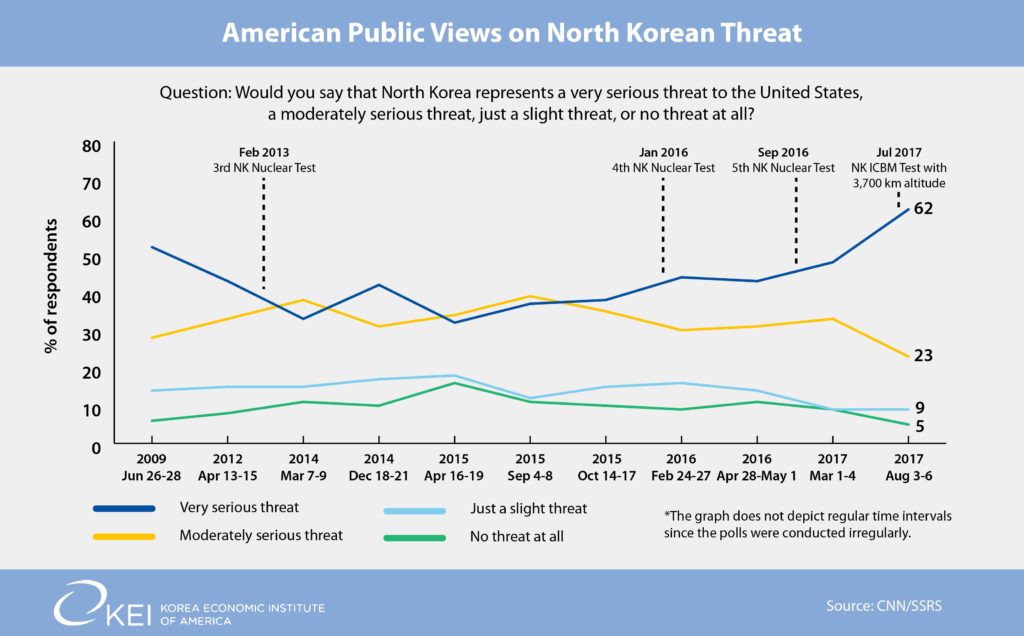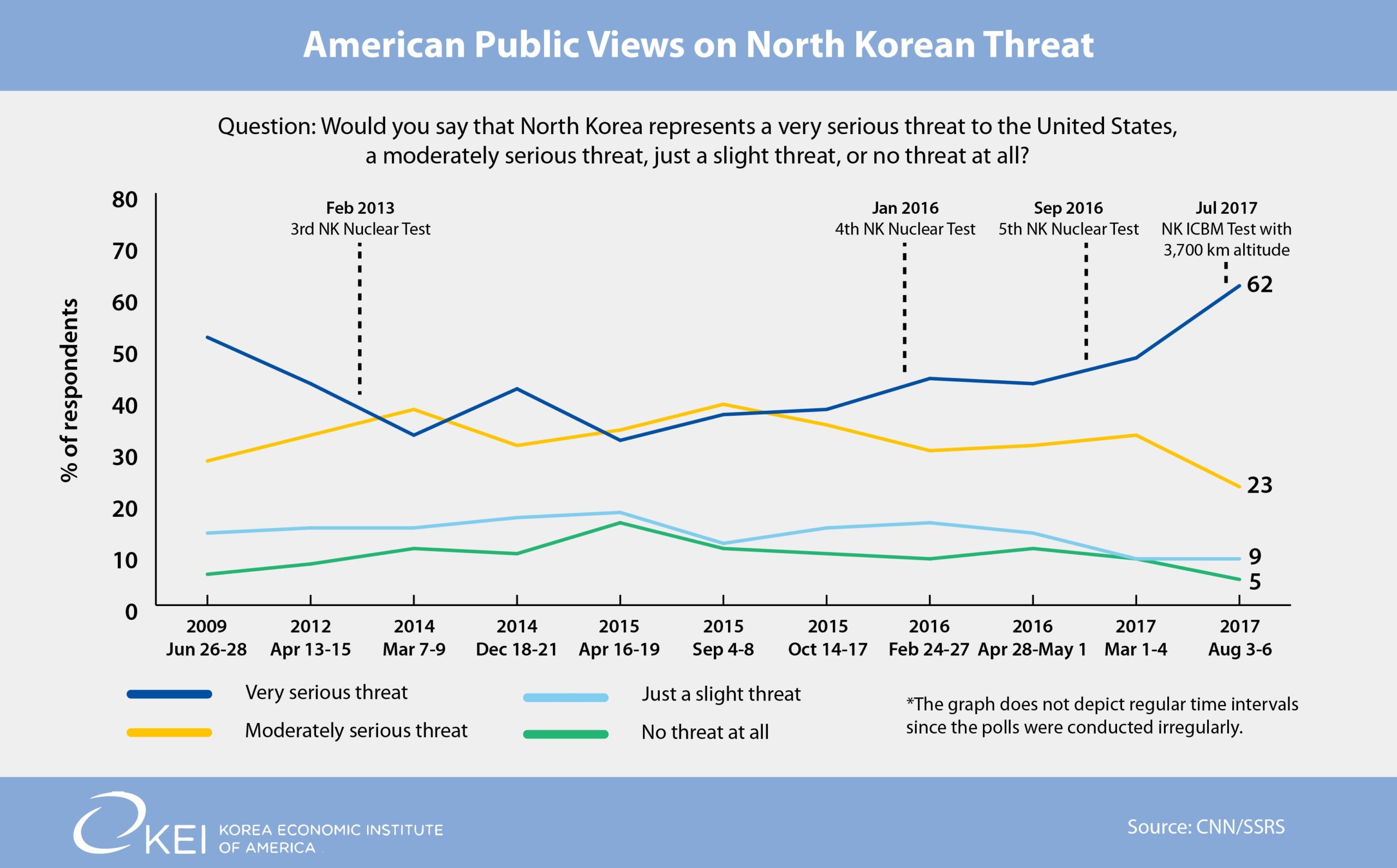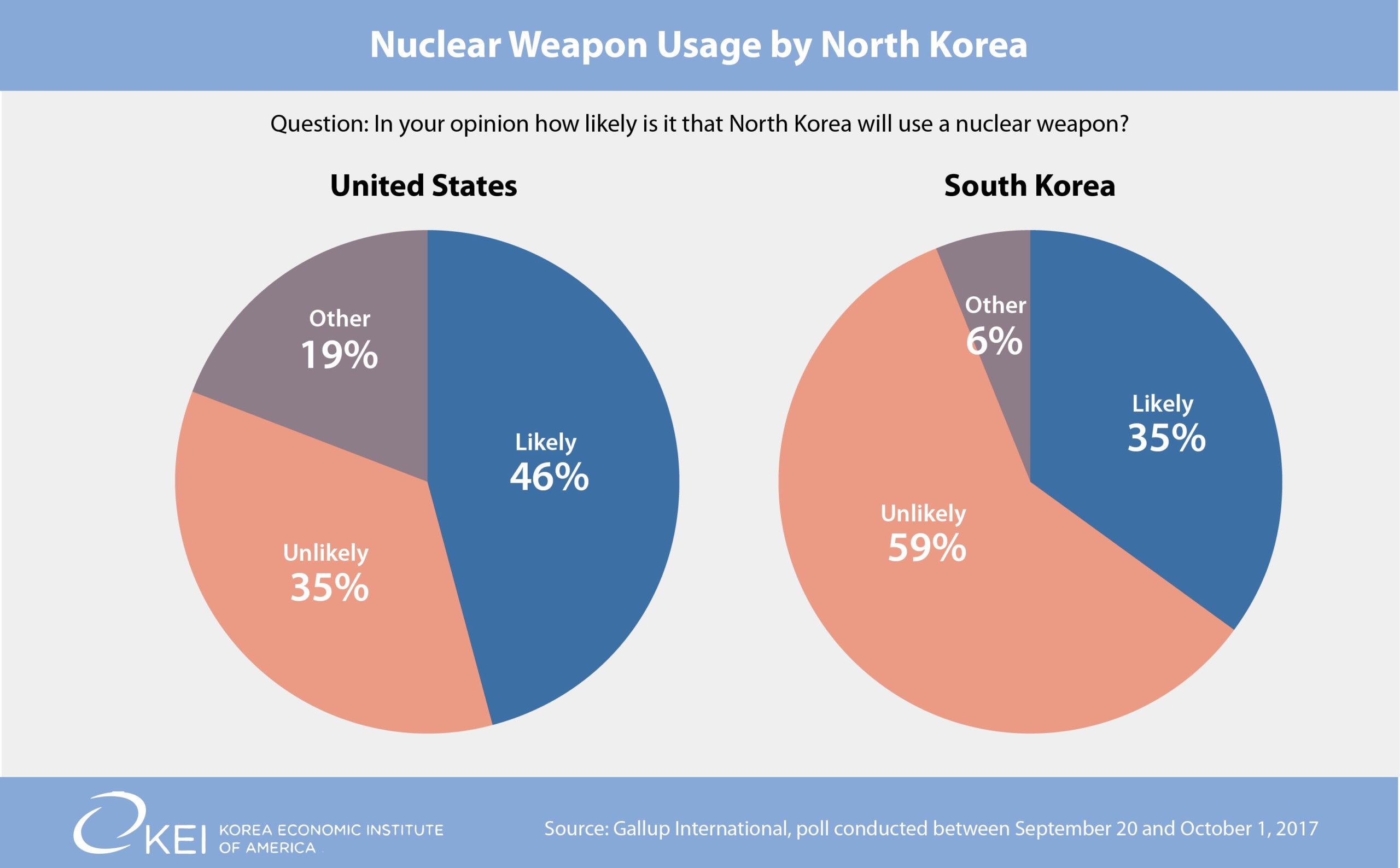The Peninsula
Why South Koreans Keep their Cool about North Korea while Americans Grow More Alarmed

By Juni Kim
North Korea shocked the international community on July 28th when it launched an ICBM (intercontinental ballistic missile) that demonstrated the rogue nation’s ability to reach the continental United States. The missile launch was followed by North Korea’s sixth and most powerful nuclear test on September 2nd. U.S. President Donald Trump responded to recent actions like these with heated rhetoric, including at one point threatening North Korea with “fire and fury like the world has never seen.”
The recent string of events has not gone unnoticed by the American public, and many are increasingly concerned by the North Korean threat. A survey conducted in July by the Chicago Council on Global Affairs reported that 75% of Americans now view North Korea’s nuclear program as a critical threat, which increased from 60% in 2016 and 55% in 2015. Similarly, a CNN poll conducted by SRSS in August indicated that 62% of Americans say that North Korea is a very serious threat, which has grown substantially since early 2015 when only 32% thought so.

Despite growing American concerns over North Korea’s weapons capabilities, South Koreans have responded in a more sanguine manner in recent years and increasingly view war with North Korea as less likely. In response to the question over the possibility of North Korea starting a war, a series of Gallup Korea polls over time (as seen below) shows that 58% of South Koreans think that it is not possible compared to 37% that think it is possible. In over 25 years of poll results, the only period of time where South Koreans were more optimistic than the present day was during the “Sunshine Policy” years of the early 2000’s. In another Gallup International poll, South Koreans are similarly more doubtful of North Korean nuclear weapons use (59% say it is unlikely) compared to Americans (35% say it is unlikely).

Why do South Koreans remain relatively undaunted by North Korea while Americans grow increasingly anxious? There is no blanket reason that wholly explains the diverging trends, but differences in media coverage and South Korea’s lengthy and personal history with its northern counterpart both factor in how people in both countries think about North Korea.
There is an old saying in news that “if it bleeds, it leads,” and that type of mentality readily displays itself in U.S. media coverage of North Korea. In a study by KEI’s Director of Communications Jenna Gibson, the top three keywords in U.S. news headlines in 2016 about Korea are “nuclear,” “missile,” and “test.” All three words relate to North Korean provocations and highlight North Korea as a military threat. During a panel at KEI on North Korean media coverage last week, Kang In-sun, the Washington Bureau Chief at Chosun Ilbo, echoed how North Korean headlines in the U.S. gravitate towards more threatening stories. She stated, “Journalism is always pursuing sensationalism. They are more interested in war scenarios and military options than negotiations and dialogue. The situation is a little bit more exaggerated than it is.” In comparison, Dohoon Kim, Editor in Chief of HuffPost Korea, humorously noted how North Korea’s nuclear test in January 2016 quickly faded from headlines in South Korea. He recalled, “I’m not saying what happened wasn’t dangerous, but the fact is Koreans in less than a day have turned away from that news. To be honest, even the day it happened, people here didn’t make a huge fuss about it. For example, the most popular article during the last two days on HuffPost Korea was ‘Nine Things That Make Good Employees Quit.’”

The U.S. and South Korea also share two very different histories with North Korea that affect how they view the current North Korean crisis. Although North Korea has posed a critical threat to South Korea since its inception, the United States has only had to grapple with the concept of a direct North Korean threat recently when missile tests displayed the capability to reach American shores. In comparison, South Korea experienced multiple presidential assassination attempts by North Korean operatives, terrorist attacks, the bombing of South Korean cabinet members, the sinking of its military vessels, and other deadly incidents at the hands of North Korea for more than half a century. The recent developments in North Korea’s nuclear and missile technology is certainly troubling for South Koreans, but sadly only the latest chapter in a bitter decades-long conflict between the two Koreas.
It may be tempting to view South Koreans as having grown indifferent to the North Korean threat based on the poll numbers, but that would be an unfair and simplistic assessment. In a column for The Guardian, Haeryun Kang of Korean Expose suggested that South Korean attitudes to the North are much more complicated than it first seems. She explained, “The reality of South Korean ‘indifference’ is complex and even contradictory… Behind the indifference lies also years of fear, deep and even subconscious.” Having to live with a constant existential threat is unsettling, but it has been a fact of daily living in South Korea for as long as most South Koreans have lived. In other words, fear of a North Korean attack certainly exists in South Korea, but it has become in a sense normalized after decades of tense coexistence. The poll numbers also suggest that younger South Koreans are not as acclimated to the threat as older citizens. Of all age demographics, South Koreans in their 20’s indicated the most concern over North Korea with 53% saying it is likely that North Korea will use a nuclear weapon and 42% saying war is likely with the North.
There are certainly other factors in play as well, like caricatures of North Korea in U.S. media, and they are worth considering when analyzing the divide in public concern between America and South Korea. This is also not to say that North Korea should be treated lightly and not viewed as a serious threat to the United States. The developments in North Korea’s weapons capabilities over the past few years rightly demand the attention of the American public, but a problem like North Korea should be approached with rationality and not sensationalist belief.
Juni Kim is the Program Manager and Executive Assistant at the Korea Economic Institute of America (KEI). The views expressed here are the author’s alone.
Photo from Uri Tours’ photostream on flickr Creative Commons.
